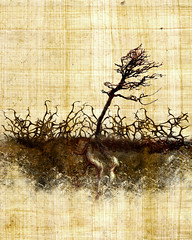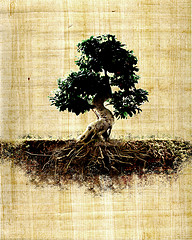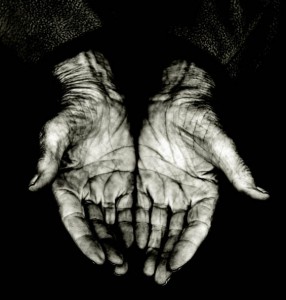1That same day Jesus went out of the house and sat beside the sea. 2And great crowds gathered about him, so that he got into a boat and sat down. And the whole crowd stood on the beach. 3And he told them many things in parables, saying: “A sower went out to sow. 4And as he sowed, some seeds fell along the path, and the birds came and devoured them. 5Other seeds fell on rocky ground, where they did not have much soil, and immediately they sprang up, since they had no depth of soil, 6but when the sun rose they were scorched. And since they had no root, they withered away. 7Other seeds fell among thorns, and the thorns grew up and choked them. 8Other seeds fell on good soil and produced grain, some a hundredfold, some sixty, some thirty. 9He who has ears, let him hear.” (Matthew 13:1-9)
 God’s word bounces off some people like seeds off asphalt. Others receive it gladly, but soon forget it. Others are too tangled up in life’s complications to benefit from it. Yet some absorb it and are transformed. What makes the difference? Let’s look at Jesus’ explanation of these four types of people in Matthew 13:18-23 to find out.
God’s word bounces off some people like seeds off asphalt. Others receive it gladly, but soon forget it. Others are too tangled up in life’s complications to benefit from it. Yet some absorb it and are transformed. What makes the difference? Let’s look at Jesus’ explanation of these four types of people in Matthew 13:18-23 to find out.
What is “the Word of the Kingdom?”
First we need to define a phrase you are going to see: the word of the kingdom. It refers most directly to the good news that Jesus, the ultimate King, is ushering into reality the ultimate Kingdom by forgiving rebel sinners and granting them full citizenship.
Indirectly, it can refer to all of God’s words, which include the entire Bible. So, when someone tells you about Jesus, when you hear a Bible-based sermon, when you read the Bible and even now as you read this post, you are receiving “the word of the kingdom.”

Some are Hard Soil
18“Hear then the parable of the sower: 19When anyone hears the word of the kingdom and does not understand it, the evil one comes and snatches away what has been sown in his heart. This is what was sown along the path.” (Matthew 13:18-19)
The word sprinkles onto these people like grass seed onto pavement. It does not matter how much seed is poured. Fertilizer, lime, irrigation—nothing will cause those seeds to take root and sprout. Hard soil people can read Genesis through Revelation, hear the finest preacher’s best sermon and sit beside Billy Graham for 13 hours on a 747 and remain unfazed.
Why is this the case? Should not God’s word, which is elsewhere in the Bible called “the power of God for salvation” (Romans 1:16), eventually sink in and burst through the pavement? For the hard soil person, it does not get the chance because the evil one is forever perched above them, stomach growling. Every time a seed drops, he swoops down and snatches it.

Some are Shallow Soil
20As for what was sown on rocky ground, this is the one who hears the word and immediately receives it with joy, 21yet he has no root in himself, but endures for a while, and when tribulation or persecution arises on account of the word, immediately he falls away. (Matthew 13:20-21)
In contrast to the hard soil person, the shallow soil person is hyper-responsive to God’s word—but only for a while. These are the temporarily ‘all in’ people who shoot through churches for a couple of weeks or months, participating in every activity they can, and then disappear. The seed takes immediately, but has no room to grow because shallow soil people “have no root within them.” The word sits under one thin surface layer and cannot survive heat. Pressure to turn away, distress at the cost of following Jesus or coercion from the world and other people quickly scald the seed to death.
This is a painful reality for me as a pastor. I have baptized only a few people. Of that small number, two-thirds now have no discernible connection with Jesus. What happened? They were enthusiastic when we met about baptism and excited when they emerged from the water, yet now they are gone. I am left to assume that they are shallow soil people.

Some are Compromised Soil
22As for what was sown among thorns, this is the one who hears the word, but the cares of the world and the deceitfulness of riches choke the word, and it proves unfruitful. (Matthew 13:22)
The Greek word translated choke is a combination of two words, one meaning identify with, the other meaning choke. Compromised people are so tightly entangled with “thorns” that you can no longer see them. Their thorns are their identity.
Jesus calls these thorns “the cares of the world and the deceitfulness of riches.” Mark phrases it, “the desire for other things.” Luke writes, “the cares and riches and pleasures of life.” Worries, anxieties, financial concerns, wants, wishes, small pleasures: These are the weeds that brutally choke the word’s effectiveness in the compromised person’s life. They tug and yank at their minds and hearts until the seed suffocates, rendering them spiritually barren.

Some are Good Soil
23As for what was sown on good soil, this is the one who hears the word and understands it. He indeed bears fruit and yields, in one case a hundredfold, in another sixty, and in another thirty.” (Matthew 13:23)
Good soil people hear the word of the kingdom, understand it and bear fruit.
They hold fast to the word, making it their own. Their Bibles are worn with use and scarred with notations. Their hands are busy taking notes during the sermon so they can apply what they hear through the week. They grow more Christ-like over time, confessing and repenting of their sins—changing. Over the years, as the seeds continue to take root and blossom, they increase in love, joy, peace, patience, kindness, goodness, faithfulness, gentleness and self-control (Galatians 5:22-23). The effects expand beyond themselves into others as they speak to them about Jesus.
A Hopeless Situation and the Good News
As I survey the soils, I am struck by the hopelessness of the first three. Bad soil cannot change itself into good soil. Jesus offers no advice for becoming good soil. He simply states the facts. Some people are too hard, shallow and compromised to receive the word in a transformative way.
Taking into account the rest of the Bible, it seems that all people, aside from Jesus himself, are in this condition. “No one is good except God alone” (Mark 10:18). “For we have already charged that all, both Jews and Greeks, are under sin, as it is written, ‘none is righteous, no, not one; no one understands; no one seeks for God. All have turned aside; together they have become worthless; no one does good, not even one” (Romans 3:9-12). “And you were dead in your trespasses and sins in which you once walked…” (Ephesians 2:1).
The good news is that God sometimes changes hard, shallow, compromised patches of dirt into fertile gardens. “And I will give you a new heart, and a new spirit I will put within you. And I will remove the heart of stone from your flesh and give you a heart of flesh” (Ezekiel 36:26). 1 Corinthians 5:17 says, “Therefore, if anyone is in Christ, he is a new creation. The old has passed away; behold, the new has come.” Those same dirty hands that created Adam out of the dust of the ground recreate those who put on Jesus.
I realize that is a strange phrase, “put on Jesus.” This is how the Bible describes becoming a Christian. It includes the entire process of recognizing that you need Jesus’ payment for your sins on the cross, accepting God’s forgiveness based on Jesus’ death for you and then following Jesus as your Lord. This is like putting on new clothes. Jesus becomes your protection and your identity. Once you are thus made new, you begin to grow into your new identity over time, like a garden grows fruit.
So do not read this passage and despair or grab your spiritual work gloves and try to change yourself. Instead, go to The Gardener in prayer and ask to become new soil through Jesus.
Discussion Starters
- What strikes you most in this passage? Why?
- Which of the soils do you most identify with? Why?
- Read Romans 1:16-17. Is the word not powerful enough to take root, even in bad soil?
- Brainstorm what common “cares of the world” and “deceitfulness of riches” might choke the word’s effectiveness in our lives?
- Passages like Mark 10:18, Romans 2:9-12 and Ephesians 2:1 indicate that all people start off as bad soil. Based on this, read Ezekiel 36:26 and 1 Corinthians 5:17 and discuss God’s plan for dealing with bad-soil people.
- How does this parable effect the way you approach evangelism?
- How does this parable effect the way you think about Dulin’s Grove, or church in general?
- Are there people in your life that you’re concerned about who might be bad soil? Share with the group (as anonymously as is necessary) so you can pray together for them.
The pictures in this post were created by Madison Murphy.




Dear Matt, I like how you described in contemporary ways the 4 types of soils. Thanks for sharing, James